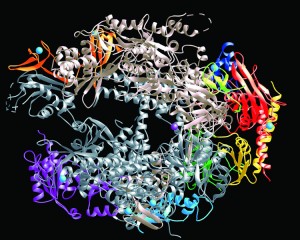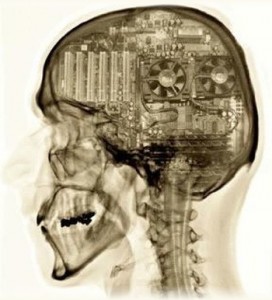If you thought that online gamers were just a load of geeks, incapable of socializing with the outside world, and living within the confines of their own in their bedrooms, you might like to have a look this website called Foldit. Foldit is a game, but its aim is to solve puzzles for science, and players have recently made some remarkable inroads into the world of protein modelling. Below is a model of an Amino Acid, and it is this type of thing that gamers manipulate.
 This article that explains the process is in the online journal Nature, Structure and Molecular Biology, and begins with the following statement:
This article that explains the process is in the online journal Nature, Structure and Molecular Biology, and begins with the following statement:
“Following the failure of a wide range of attempts to solve the crystal structure of M-PMV retroviral protease by molecular replacement, we challenged players of the protein folding game Foldit to produce accurate models of the protein. Remarkably, Foldit players were able to generate models of sufficient quality for successful molecular replacement and subsequent structure determination. The refined structure provides new insights for the design of antiretroviral drugs.”
The fold it game has existed for a couple of years now. Players create protein structures, with the most stable and low energy structures scoring the most points.
The gamers in general are not scientists and they manually manipulate the model from a base form that is provided to them at the start of the operation. They have a variety of tools but the most important thing is that they have better spatial reasoning skills than computers. Computer models had tried to solve the problem cited above for 10 years without success, gamers produced an adequate model that was then refined by scientists in just 3 weeks.
We could draw similarities to citizen science, having seen posts on this blog discussing loaning out some of your computer’s spare hard disk space and memory to solve scientific problems, and the now common use of similar set ups in astronomy.
Just this week the Astronomy and Telescope journal is entitled Citizen Science, and addresses the issue of amateurs classifying high definition photos of far off galaxies. They say that it is the future of astronomic discovery. See my post on The Bassetti Foundation website for a lay explanation.
The gaming process is an interesting innovation though, as it uses skills that may not be particularly associated with science, but reveal themselves to be extremely important.
